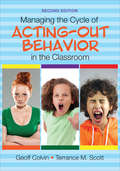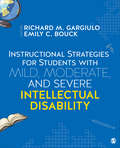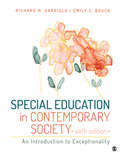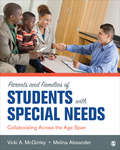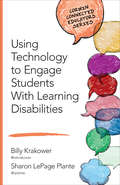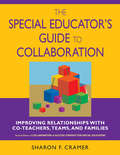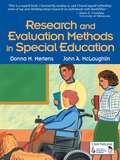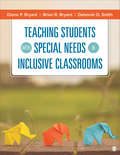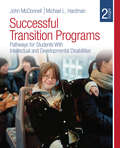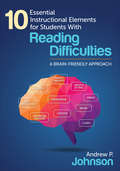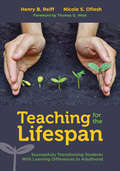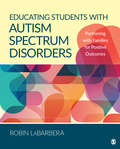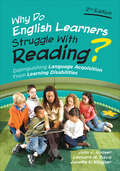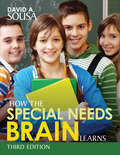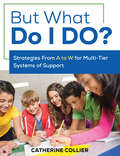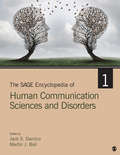- Table View
- List View
Managing the Cycle of Acting-Out Behavior in the Classroom
by Geoffrey T. Colvin Terrance M. ScottMinimize problem behavior and maximize student success! Acting-out behavior by students manifests in ways that make classroom management and teaching very challenging. Building on a model using seven phases of acting-out behavior presented in the first edition, the newly updated edition draws on new research in applied behavior analysis, sound instructional principles, and functional behavior assessment to deliver a clear roadmap for educators to design interventions in a clear, systematic, and achievable matter. Features include: Managing each phase of the acting-out cycle—from structuring the classroom, to handling escalated behavior, to recovery Case studies that distill concrete action steps from the book’s concepts Checklists, tools, resources, and templates for applying the book’s principles to any classroom
Instructional Strategies for Students With Mild, Moderate, and Severe Intellectual Disability
by Richard M. Gargiulo Emily C. BouckStrategies for Students with Mild, Moderate, and Severe Intellectual Disabilities is a textbook for undergraduate and graduate students enrolled in special and general education teacher preparation programs (as well as practicing professionals) offering a solid, research based text on instructional methodologies for teaching students with intellectual disability across the spectrum of intellectual abilities. The book addresses both academic and functional curricula in addition to behavioral interventions. Additionally, Instructional Strategies for Students Mild, Moderate, and Severe Intellectual Disability adopts developmental or life span approach covering preschool through adolescence and young adulthood.
Instructional Strategies for Students With Mild, Moderate, and Severe Intellectual Disability
by Richard M. Gargiulo Emily C. BouckStrategies for Students with Mild, Moderate, and Severe Intellectual Disabilities is a textbook for undergraduate and graduate students enrolled in special and general education teacher preparation programs (as well as practicing professionals) offering a solid, research based text on instructional methodologies for teaching students with intellectual disability across the spectrum of intellectual abilities. The book addresses both academic and functional curricula in addition to behavioral interventions. Additionally, Instructional Strategies for Students Mild, Moderate, and Severe Intellectual Disability adopts developmental or life span approach covering preschool through adolescence and young adulthood.
Special Education in Contemporary Society: An Introduction to Exceptionality
by Richard M. Gargiulo Emily C. Bouck2015 Recipient of the Textbook Excellence Award from the Text and Academic Authors Association (TAA) The Sixth Edition of Richard Gargiulo’s well-respected Special Education in Contemporary Society: An Introduction to Exceptionality offers a comprehensive, engaging, and easy-to-read introduction to special education. Grounded in research and updated to reflect the most current thinking and standards of the field, the book provides students with the skills and knowledge to become successful teachers. Richard Gargiulo and new co-author Emily Bouck encourage a deep awareness and understanding of the human side of special education. Their book provides students a rare look into the lives of exceptional students and their families, as well as the teachers that work with exceptional persons throughout their lives. The new edition maintains the broad context and research focus for which the book is known, while expanding on current trends and contemporary issues to better serve both pre-service and in-service teachers of exceptional individuals. The text is organized into two distinct parts to offer students a truly comprehensive and humane understanding of exceptionality. In Part I, readers are provided strong foundational perspective on broad topics that affect all individuals with an exceptionality. In Part II, the authors engage students with thorough examinations of individual exceptionalities, and discuss historical, personal, and educational details of each exceptionality as it affects a person across the lifespan.
Special Education in Contemporary Society: An Introduction to Exceptionality
by Richard M. Gargiulo Emily C. Bouck2015 Recipient of the Textbook Excellence Award from the Text and Academic Authors Association (TAA) The Sixth Edition of Richard Gargiulo’s well-respected Special Education in Contemporary Society: An Introduction to Exceptionality offers a comprehensive, engaging, and easy-to-read introduction to special education. Grounded in research and updated to reflect the most current thinking and standards of the field, the book provides students with the skills and knowledge to become successful teachers. Richard Gargiulo and new co-author Emily Bouck encourage a deep awareness and understanding of the human side of special education. Their book provides students a rare look into the lives of exceptional students and their families, as well as the teachers that work with exceptional persons throughout their lives. The new edition maintains the broad context and research focus for which the book is known, while expanding on current trends and contemporary issues to better serve both pre-service and in-service teachers of exceptional individuals. The text is organized into two distinct parts to offer students a truly comprehensive and humane understanding of exceptionality. In Part I, readers are provided strong foundational perspective on broad topics that affect all individuals with an exceptionality. In Part II, the authors engage students with thorough examinations of individual exceptionalities, and discuss historical, personal, and educational details of each exceptionality as it affects a person across the lifespan.
Parents and Families of Students With Special Needs: Collaborating Across the Age Span
by Dr Vicki A. McGinley Dr Melina AlexanderParents and Families of Students With Special Needs: Collaborating Across the Age Span teaches students the skills they need to effectively collaborate with parents and families to ensure a child's success in the classroom. Authors Vicki A. McGinley and Melina Alexander’s text takes a lifespan approach with a special emphasis on the critical transition points in a child’s life. Information is provided on what can be seen at each stage of an individual with disabilities’ development, and addresses concerns and needs that families may have during these unique phases of growth. Chapters written by professors and professionals who are also parents of students with special needs bring a diverse range of voices into the narrative. The authors provide an in-depth discussion of how parents and families are affected by particular disabilities, family system theory, the laws that affect individuals with disabilities, and assessments for individuals with disabilities.
Parents and Families of Students With Special Needs: Collaborating Across the Age Span
by Dr Vicki A. McGinley Dr Melina AlexanderParents and Families of Students With Special Needs: Collaborating Across the Age Span teaches students the skills they need to effectively collaborate with parents and families to ensure a child's success in the classroom. Authors Vicki A. McGinley and Melina Alexander’s text takes a lifespan approach with a special emphasis on the critical transition points in a child’s life. Information is provided on what can be seen at each stage of an individual with disabilities’ development, and addresses concerns and needs that families may have during these unique phases of growth. Chapters written by professors and professionals who are also parents of students with special needs bring a diverse range of voices into the narrative. The authors provide an in-depth discussion of how parents and families are affected by particular disabilities, family system theory, the laws that affect individuals with disabilities, and assessments for individuals with disabilities.
Using Technology to Engage Students With Learning Disabilities (Corwin Connected Educators Series)
by William A. Krakower Sharon LePage PlanteLeverage technology to engage students with learning disabilities! Harness the power of today’s technology to improve learning and engagement for students with learning disabilities. By engaging students with learning disabilities using the technology already at your fingertips, you’ll see your students begin to thrive and grow in exciting new ways. In this volume in the Connected Educators Series, you’ll discover: New ideas for using assistive technology to teach core subjects and study skills How to build positive opportunities for students to show what they know Tools to provide better content accessibility How to help students connect and share through technology tools
Using Technology to Engage Students With Learning Disabilities (Corwin Connected Educators Series)
by William A. Krakower Sharon LePage PlanteLeverage technology to engage students with learning disabilities! Harness the power of today’s technology to improve learning and engagement for students with learning disabilities. By engaging students with learning disabilities using the technology already at your fingertips, you’ll see your students begin to thrive and grow in exciting new ways. In this volume in the Connected Educators Series, you’ll discover: New ideas for using assistive technology to teach core subjects and study skills How to build positive opportunities for students to show what they know Tools to provide better content accessibility How to help students connect and share through technology tools
The Special Educator's Guide to Collaboration: Improving Relationships With Co-Teachers, Teams, and Families
by Sharon F. CramerFind case stories from up-to-date research, reflection activities, structured research and interview activities for developing collaboration skills.
Research and Evaluation Methods in Special Education
by Donna M. MertensThis excellent resource provides an approach to research and evaluation that helps educators better understand and address the needs of students with various disabilities.
Teaching Students With Special Needs in Inclusive Classrooms
by Brian R. Bryant Dr Diane P. Bryant Dr Deborah D. SmithEquip and empower today’s classroom teachers to ADAPT to the needs of all of their students. Using the research-validated ADAPT framework, Teaching Students with Special Needs in Inclusive Classrooms helps future teachers determine how, when, and with whom to use proven academic and behavioral interventions to obtain the best outcomes for students with disabilities. Through clear language and practical examples, authors Diane P. Bryant, Brian R. Bryant, and Deborah D. Smith show how to create truly inclusive classrooms through evidence-based practices and hands-on strategies. This book will provide the skills and inspiration that teachers need to make a positive difference in the educational lives of struggling learners. The text is written to meet the needs of those majoring in general education, special education, and blended teacher education programs.
Successful Transition Programs: Pathways for Students With Intellectual and Developmental Disabilities (Second Edition)
by Michael L Hardman John McDonnellAddressing the full range of curricular and instructional issues that face professionals working in middle school, high school, and post-high school programs, Successful Transition Programs: Pathways for Students With Intellectual and Developmental Disabilities, Second Edition is the most relevant text available for teachers and administrators. Authors John McDonnell and Michael L. Hardman take the position that the most effective transition programs are those that cumulatively build on the capacity of students for employment, community living, and citizenship.
10 Essential Instructional Elements for Students With Reading Difficulties: A Brain-Friendly Approach
by Andrew P. JohnsonBrain-friendly strategies to help all students become lifelong readers Learning to read is more than just an educational issue; it’s a social justice issue. Did you know that struggling readers are twice as likely as their peers to drop out of high school? Through time-tested, research-based neurocognitive teaching strategies, 10 Essential Instructional Elements for Students with Reading Difficulties will enable you to hone readers’ skills and help students from all grade levels develop their ability to create meaning from print. Drawing from five key areas of neurocognitive research, Andrew Johnson provides a ten-point teaching strategy that encompasses vocabulary, fluency, comprehension, writing and more. A key resource for creating intervention plans for struggling readers, features include: Information on the often-overlooked importance of emotions in the process of overcoming reading struggles Strategies to promote voluntary reading, even for the most reluctant students Useful resources such as graphic organizers, additional reading and writing activities, and QR codes that link to videos Use these strategies today and you can count on more students leaving your classrooms as fluent, lifelong readers. "Dr. Johnson tells the story of reading in a logical and clear manner with a book that is excellently researched, immaculately referenced, and full of practical tips for the practitioner." Terry Bernstein, Former Senior Literacy Difficulties Specialist London Boroughs of Camden and Westminster, UK "This is the text I wish I had when I began to teach. Dr. Johnson clearly illustrates the process our brain uses to create meaning from text." Marty Duncan, Ed.D., Author and Former Educator
Teaching for the Lifespan: Successfully Transitioning Students With Learning Differences to Adulthood
by Henry B. Reiff Nicole S. OfieshYour step-by-step guide to successful transition planning Finally, here’s a practical guide that makes transition planning easier. Backed by the latest research in learning and development, Teaching for the Lifespan provides you with the pedagogical best practices to promote your students’ strengths for life-long success. You’ll benefit from: A deep understanding of the educational, vocational, social, and emotional dimensions of adulthood for students with learning differences Techniques to help students with learning differences develop an awareness of proactive behaviors Strategies to help all learners achieve the demands of the Common Core and high-stakes assessments through Universal Design for Learning (UDL)
Educating Students with Autism Spectrum Disorders: Partnering with Families for Positive Outcomes
by Robin L. LaBarberaEducating Students with Autism Spectrum Disorders: Partnering with Families for Positive Outcomes focuses on practical strategies for educating children with autism spectrum disorders in the classroom. Additional features describe how to partner with families in the implementation of many of the strategies, giving voice to parents, based on recent quantitative and qualitative research. Case studies developed from real interviews with parents and educators open each chapter, and the book focuses on what "works" and what "does not work" in their collaborative experiences.
Educating Students with Autism Spectrum Disorders: Partnering with Families for Positive Outcomes
by Robin L. LaBarberaEducating Students with Autism Spectrum Disorders: Partnering with Families for Positive Outcomes focuses on practical strategies for educating children with autism spectrum disorders in the classroom. Additional features describe how to partner with families in the implementation of many of the strategies, giving voice to parents, based on recent quantitative and qualitative research. Case studies developed from real interviews with parents and educators open each chapter, and the book focuses on what "works" and what "does not work" in their collaborative experiences.
Why Do English Learners Struggle With Reading?: Distinguishing Language Acquisition From Learning Disabilities
by John J. Hoover Leonard M. Baca Janette Kettmann KlingnerMake the right instructional and eligibility decisions to help your English Learners! Do your students' reading difficulties reflect language acquisition issues or a learning disability? Now in an updated second edition, this essential guide helps educators make informed choices about strategies and services to support English Learners, and includes: Nine common misconceptions that can lead to wrongful placement of students in Special Education A new chapter on evidence-based practices for success in teaching reading to students learning English Appropriate techniques to use when assessing students for special education Expanded coverage of Response to Intervention to include a multi-tiered system of supports (MTSS)
Why Do English Learners Struggle With Reading?: Distinguishing Language Acquisition From Learning Disabilities
by John J. Hoover Leonard M. Baca Janette Kettmann KlingnerMake the right instructional and eligibility decisions to help your English Learners! Do your students' reading difficulties reflect language acquisition issues or a learning disability? Now in an updated second edition, this essential guide helps educators make informed choices about strategies and services to support English Learners, and includes: Nine common misconceptions that can lead to wrongful placement of students in Special Education A new chapter on evidence-based practices for success in teaching reading to students learning English Appropriate techniques to use when assessing students for special education Expanded coverage of Response to Intervention to include a multi-tiered system of supports (MTSS)
How the Special Needs Brain Learns
by Dr David A. SousaTeaching students with learning challenges just got easier with this groundbreaking guide! If you’ve been searching for effective strategies to meet the needs of learning challenged students, look no further. In this newly revised and updated third edition, expert David A. Sousa addresses the causes of common learning disabilities and provides alternative instructional strategies to ensure learning occurs. Discover cutting-edge brain research to help you: Effectively instruct students with ADHD, LD, dyslexia, autism, and more Utilize assistive technologies to remove barriers to learning Differentiate instruction in speech, reading, writing, and mathematics
How the Special Needs Brain Learns
by Dr David A. SousaTeaching students with learning challenges just got easier with this groundbreaking guide! If you’ve been searching for effective strategies to meet the needs of learning challenged students, look no further. In this newly revised and updated third edition, expert David A. Sousa addresses the causes of common learning disabilities and provides alternative instructional strategies to ensure learning occurs. Discover cutting-edge brain research to help you: Effectively instruct students with ADHD, LD, dyslexia, autism, and more Utilize assistive technologies to remove barriers to learning Differentiate instruction in speech, reading, writing, and mathematics
But What Do I DO?: Strategies From A to W for Multi-Tier Systems of Support
by Catherine C. CollierIdentifying appropriate strategies for instruction or intervention made easy! Select individualized and evidence-based interventions for struggling students with this comprehensive guide. Organized around an alphabetized and cross-referenced list and a fold-out selection grid featuring more than 150 PBIS, RTI and MTSS interventions, you’ll quickly find the tools to resolve specific learning and behavioral challenges. You’ll learn to Meet the needs of all your struggling students including at-risk, culturally and linguistically diverse, as well as those with IEPs Progress monitor, document, and modify instructional strategies Identify specific interventions for distinct learning and behavior problems Implement in variety of settings, including special education, learning assistance programs, and full-inclusion
But What Do I DO?: Strategies From A to W for Multi-Tier Systems of Support
by Catherine C. CollierIdentifying appropriate strategies for instruction or intervention made easy! Select individualized and evidence-based interventions for struggling students with this comprehensive guide. Organized around an alphabetized and cross-referenced list and a fold-out selection grid featuring more than 150 PBIS, RTI and MTSS interventions, you’ll quickly find the tools to resolve specific learning and behavioral challenges. You’ll learn to Meet the needs of all your struggling students including at-risk, culturally and linguistically diverse, as well as those with IEPs Progress monitor, document, and modify instructional strategies Identify specific interventions for distinct learning and behavior problems Implement in variety of settings, including special education, learning assistance programs, and full-inclusion
The SAGE Encyclopedia of Human Communication Sciences and Disorders
by Dr Jack S. Damico Professor Martin J. BallThe SAGE Encyclopedia of Human Communication Sciences and Disorders is an in-depth encyclopedia aimed at students interested in interdisciplinary perspectives on human communication—both normal and disordered—across the lifespan. This timely and unique set will look at the spectrum of communication disorders, from causation and prevention to testing and assessment; through rehabilitation, intervention, and education. Examples of the interdisciplinary reach of this encyclopedia: A strong focus on health issues, with topics such as Asperger's syndrome, fetal alcohol syndrome, anatomy of the human larynx, dementia, etc. Including core psychology and cognitive sciences topics, such as social development, stigma, language acquisition, self-help groups, memory, depression, memory, Behaviorism, and cognitive development Education is covered in topics such as cooperative learning, special education, classroom-based service delivery The editors have recruited top researchers and clinicians across multiple fields to contribute to approximately 640 signed entries across four volumes.
The SAGE Encyclopedia of Human Communication Sciences and Disorders
by Dr Jack S. Damico Professor Martin J. BallThe SAGE Encyclopedia of Human Communication Sciences and Disorders is an in-depth encyclopedia aimed at students interested in interdisciplinary perspectives on human communication—both normal and disordered—across the lifespan. This timely and unique set will look at the spectrum of communication disorders, from causation and prevention to testing and assessment; through rehabilitation, intervention, and education. Examples of the interdisciplinary reach of this encyclopedia: A strong focus on health issues, with topics such as Asperger's syndrome, fetal alcohol syndrome, anatomy of the human larynx, dementia, etc. Including core psychology and cognitive sciences topics, such as social development, stigma, language acquisition, self-help groups, memory, depression, memory, Behaviorism, and cognitive development Education is covered in topics such as cooperative learning, special education, classroom-based service delivery The editors have recruited top researchers and clinicians across multiple fields to contribute to approximately 640 signed entries across four volumes.
